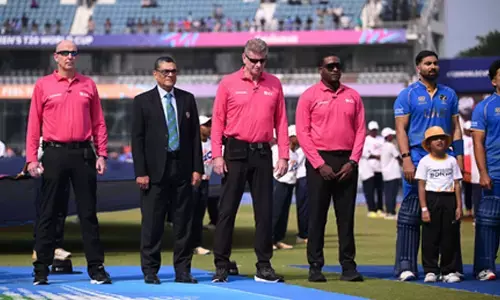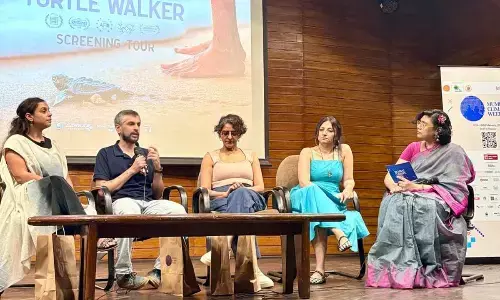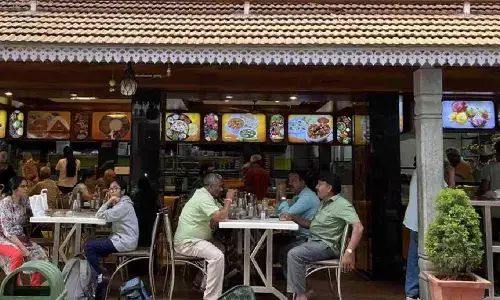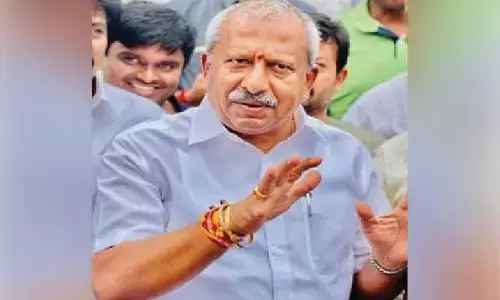MyVoice: Views of our readers 6th February 2022

MyVoice: Views of our readers 16th April 2022
Heavy snowfall thaws frozen memories of Simla
Heavy snowfall thawed the frozen memories of Simla -- the erstwhile capital of British India, as a thick quilt, and not blanket, of white covered the Queen of Hills, now called Shimla, in the past two days -- the highest spell in one and a half decades.
Old-timers recalled on Saturday that for almost two decades Shimla, which was planned for a maximum population of 16,000 and now supports over 2.50 lakh, has not recorded this kind of heavy snowfall.
Jiya Lal Panta, a retired government employee settled in the city since 1960, said till the 1980s, heavy snow was a normal feature of the town.
"If my memory serves me right, the last time the heavy snowfall occurred was during the winter of 1990-91 when the town was cut off from the rest of the country for more than two weeks," he said.
Another resident, Kavita Sud, 77, said: "The last two days of snowfall in Shimla reminds me of the childhood days when snowstorm dumps heavy snow, causing travel disruptions not for days but for weeks.
"The heavy snowfall at that time forced the authorities to shut down state services, schools, non-essential shops and even banks."
As heavy snow has eluded this erstwhile summer capital of British India in recent times, the "snow manual" of the administration, followed since the British Raj, has virtually been lying in cold storage, admit officials.
The Shimla Snow Manual lists the responsibilities and duties of the administration during snow such as the setting up of control rooms, deploying men and machinery to clear roads and pathways as well as maintaining power and drinking water supplies.
The local administration, before the onset of winter every year, holds a meeting to review measures and assign duties to handle any emergency in case of heavy snow.
Officials admit that for the past several decades, this meeting -- called the snow manual meeting -- had become a mere ritual.
"Over the years, the intensity of snowfall in Shimla has decreased. So the snow manual has lost its relevance," admitted an official who did not wish to be named.
This time the electricity, landline phones and cable television were snapped in several localities of Shimla owing to falling of trees on supply lines. Water supply was also hampered. Officials say it will days for the restoration of essential services.
However, Shimla woke up to a sunny morning on Saturday after three days of snow.
Since a majority of the roads piled with snow and treacherous owing to slippery conditions and early morning frost, the local administration ordered to keep government offices, except essential services, and educational institutions in Shimla district shut.
The road leading to the Indira Gandhi Medical College and Hospital, the stateaes prominent hospital, is too slippery for traffic and pedestrians.
Also the administration has asked tourists to avoid travelling in their vehicles beyond Shimla as the road is slippery after the snowfall.
According to the local Met office, in the past two days certain areas of Shimla like the Ridge, the US Club and Jakhu hills received more than 60 cm snowfall.
Although the Shimla Municipal Corporation has started clearing the snow on Cart Road and some VIP roads, most of the other roads are covered in a thick blanket of snow.
Journalist Himkiran Manta said that till the mid 1990s heavy snowfall was a normal feature of Shimla. There used to be four to five spells of heavy snow throughout the winter and in between there were mild to moderate ones.
"Now the intensity of snowfall is quite less compared to the past, but the miseries are more," he said.
The civic body earlier used to sprinkle salt on the roads ahead of snowfall and that helped in the clearing-up process.
"The government promoted the plantation of ornamental trees in Shimla. They are fragile and uprooted with slight high-intensity snowfall. The sturdy deodars (cedars) forests are fast depleting from Shimla's skyline," he added.
As per Met office records, Shimla experienced 62 cm of snow on February 12, 2007, which was the highest on a single day in the past 99 years.
In 2005, there was 94.3 cm of snow last month but it was spread over seven days. In 2004, 96.6 cm of snow fell in the whole of January.
Shimla, once a village that served as the summer capital of British India between 1864 and 1939 and as the seat of the Himachal Pradesh government subsequently, is known as the 'Queen of Hills' -- the moniker given to the hill station by the British colonial rulers and the town still has 91 British-era heritage buildings.
A coffee table book, "Har Ghar Kuchh Kehta Hai" -- literally meaning every house tells a stor' -- published by the state Tourism Department says as the 'summer capital' the spelling was Simla and official addition of ah' made it Shimla in the 1980s.
Bad news for bibliophiles, Amazon to shut down publishing house
Much to the disappointment of book lovers, Westland, one of the largest publishing houses in India, is being shut down by e-commerce giant Amazon, they announced on February 1. The publishing company, which was acquired by Amazon from Trent Ltd, a subsidiary of Tata Group, in 2016, has published works of several bestselling authors including Amish Tripathi, Chetan Bhagat, Ashwin Sanghi, Rashmi Bansal, Rujuta Diwekar, Preeti Shenoy, Devdutt Pattanaik, Anuja Chauhan and Ravi Subramanian.
"After a thorough review, we have made the difficult decision to no longer operate Westland. We are working closely with the employees, authors, agents, and distribution partners on this transition and we remain committed to innovating for customers in India," said Amazon in a statement. The news regarding the closure came as a shock to the editors, Westland team members and its public relations agency, who according to a staff member requesting anonymity, were informed about the decision on February 1 only. It was particularly sad for bestselling fiction writer Ashwin Sanghi, who wrote his debut novel with Westland in 2008 and went on to publish a "dozen books" over that many years.
"It is sad to see the exit of a publishing institution. The Westland team is one of the finest in the business and there are many emotions and memories of my publishing journey with them that shall always remain with me," Sanghi told PTI. Founded in 1962, Westland is one of India's largest English-language trade publishers, bringing out print books and e-books in genres ranging from popular and literary fiction to business, politics, biography, spirituality, popular science, health and self-help.
Its key publishing imprints include 'Context', which publishes award-winning literary fiction and non-fiction; 'Eka', which publishes the best of contemporary writing in Indian languages and in translation; 'Tranquebar', home to the best new fiction from the Indian subcontinent, the eponymous Westland Sport and Westland Business; and Red Panda, which publishes a range of books for children of different ages.
Several of the Westland's authors and readers took to Twitter to express their disappointment on the shutting down of a "great publishing house". "Rotten news. @karthikavk and team have run a great publishing house with a strong list of books. It has been a pleasure to work with Westland. Deeply troubling that a successful venture can be shut down this way from above, for god knows what reasons," tweeted historian Manu S Pillai, author of "The Courtesan, The Mahatma and the Italian Brahmin".
"Westland is my publisher and did so much for me, taking a chance on a non-celeb author. The editors are the best in India and they brought out the best and most hardhitting non-fiction you will see on the shelves," tweeted Kavitha Rao, author of 2021-released "Lady Doctors: The Untold Stories of India's First Women in Medicine".
"Heartbreaking and upsetting day for Indian publishing. There isn't much to say except I hope we go out and buy as many Westland/Context/Eka books we can in the coming days, for all the wonderful editors, authors, and translators who worked tirelessly to build their stellar list," tweeted Sayantan Ghosh, senior commissioning editor at publishing house Simon & Schuster. Westland books "Delhi: A Soliloquy" and "Indian Icon: A Cult Called Royal Enfield' were declared winners of the prestigious 'JCB Prize for Literature' and 'Gaja Capital Business Book Prize' last year, respectively.
25 United Nations, associated personnel killed in malicious attacks during 2021
At least 25 United Nations staff members and associated personnel – one civilian and 24 peacekeepers, including two women peacekeepers – were killed in deliberate attacks during 2021, according to the Standing Committee for the Security and Independence of the International Civil Service of the United Nations Staff Union.
"Once again, United Nations staff members, especially 'blue helmets', serving in the world's most dangerous places paid the highest price", said the United Nations Staff Union President, Aitor Arauz. "No one was apprehended and sentenced for such crimes. We call on Governments to do the utmost to protect United Nations personnel and prosecute their killers."
For the eighth year in a row, the United Nations Multidimensional Integrated Stabilization Mission in Mali (MINUSMA) was the world's most dangerous, with 19 peacekeepers killed there, followed by four fatalities in the United Nations Multidimensional Integrated Stabilization Mission in the Central African Republic (MINUSCA). This brings the death toll to at least 462 United Nations and associated personnel who were killed in deliberate attacks in the past 11 years from improvised explosive devices, rocket-propelled grenades, artillery fire, mortar rounds, landmines, armed and successive ambushes, convoy attacks, suicide attacks and targeted assassinations.
The peacekeepers who died in 2021 were from Togo (8), Chad (4), Côte d'Ivoire (3), Egypt (3), Rwanda (1), Burundi (1), the Democratic Republic of the Congo (1), Gabon (1), Malawi (1) and Morocco (1). The one civilian killed was from the Democratic Republic of the Congo.
Fatality trend
The figures for preceding years are as follows: 2020 (15 killed), 2019 (28 ); 2018 (34); 2017 (71); 2016 (32 ); 2015 (51 ); 2014 (61 ); 2013 (58 ); 2012 (37); 2011 (35 ); and 2010 (15 ).
Other major incidents
On 30 July 2021, an attack against the UN main compound in Herat, Afghanistan, resulted in the killing of one Afghan security forces personnel and injuries to other. So-called anti Government elements targeted entrances of the clearly marked UN facility with rocket propelled grenades and gunfire just hours after Taliban fighters penetrated Herat city and clashed with Afghan security forces near the provincial headquarters of the United Nations Assistance Mission in Afghanistan.
On 1 November 2021, ten unarmed Egyptian peacekeepers with MINUSCA, who were newly deployed, were injured when their vehicle came under heavy fire from the presidential guard in Bangui, the Central African Republic. The peacekeepers had arrived at M'Poko International Airport as part of the periodic rotation and deployment of troops in the country and were heading to their base.
On 8 December 2021, three staff members of the Office of the United Nations High Commissioner for Refugees were wounded in an attack on a convoy in the DRC, carried out by suspected Mai-Mai militia. Unidentified attackers opened fire on the convoy, which was being escorted by MONUSCO in the Mambassa area, Lubero territory, North Kivu province. The injured personnel were traveling in a clearly marked UNHCR vehicle and were returning to the city of Beni from the town of Kirumba, in south Lubero territory, after distributing aid to displaced people.
On 30 December 2021, three peacekeepers from Tanzania serving with MINUSCA were injured when their vehicle struck an unidentified explosive device near the village of Batouri Bole, Mambéré-Kadéï, in southwest Central African Republic.









